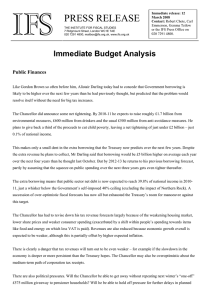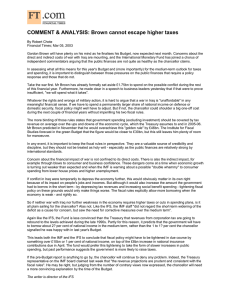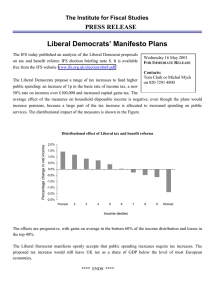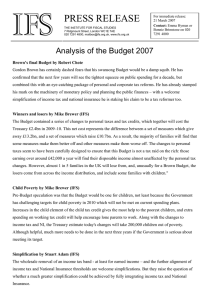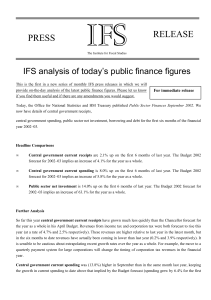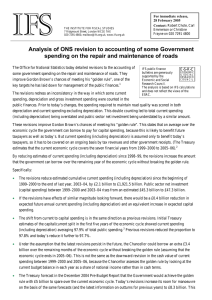IFS PRESS RELEASE
advertisement
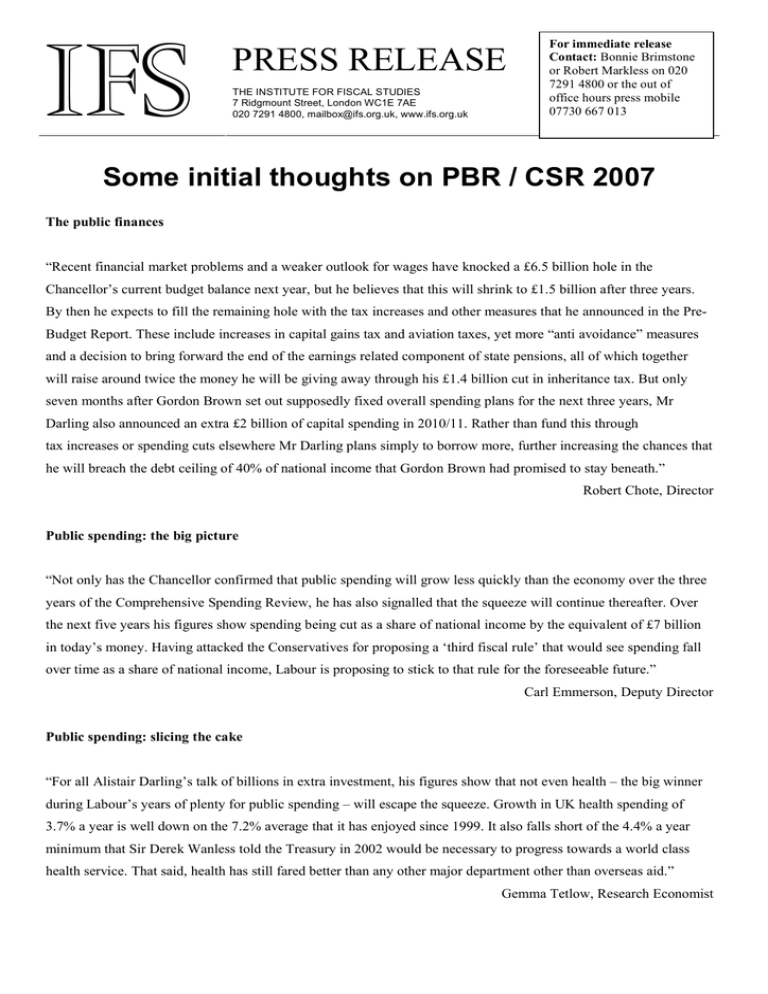
IFS PRESS RELEASE THE INSTITUTE FOR FISCAL STUDIES 7 Ridgmount Street, London WC1E 7AE 020 7291 4800, mailbox@ifs.org.uk, www.ifs.org.uk For immediate release Contact: Bonnie Brimstone or Robert Markless on 020 7291 4800 or the out of office hours press mobile 07730 667 013 Some initial thoughts on PBR / CSR 2007 The public finances “Recent financial market problems and a weaker outlook for wages have knocked a £6.5 billion hole in the Chancellor’s current budget balance next year, but he believes that this will shrink to £1.5 billion after three years. By then he expects to fill the remaining hole with the tax increases and other measures that he announced in the PreBudget Report. These include increases in capital gains tax and aviation taxes, yet more “anti avoidance” measures and a decision to bring forward the end of the earnings related component of state pensions, all of which together will raise around twice the money he will be giving away through his £1.4 billion cut in inheritance tax. But only seven months after Gordon Brown set out supposedly fixed overall spending plans for the next three years, Mr Darling also announced an extra £2 billion of capital spending in 2010/11. Rather than fund this through tax increases or spending cuts elsewhere Mr Darling plans simply to borrow more, further increasing the chances that he will breach the debt ceiling of 40% of national income that Gordon Brown had promised to stay beneath.” Robert Chote, Director Public spending: the big picture “Not only has the Chancellor confirmed that public spending will grow less quickly than the economy over the three years of the Comprehensive Spending Review, he has also signalled that the squeeze will continue thereafter. Over the next five years his figures show spending being cut as a share of national income by the equivalent of £7 billion in today’s money. Having attacked the Conservatives for proposing a ‘third fiscal rule’ that would see spending fall over time as a share of national income, Labour is proposing to stick to that rule for the foreseeable future.” Carl Emmerson, Deputy Director Public spending: slicing the cake “For all Alistair Darling’s talk of billions in extra investment, his figures show that not even health – the big winner during Labour’s years of plenty for public spending – will escape the squeeze. Growth in UK health spending of 3.7% a year is well down on the 7.2% average that it has enjoyed since 1999. It also falls short of the 4.4% a year minimum that Sir Derek Wanless told the Treasury in 2002 would be necessary to progress towards a world class health service. That said, health has still fared better than any other major department other than overseas aid.” Gemma Tetlow, Research Economist Child poverty “Despite the prospect of missing the Government's child poverty target for 2010/11 by 800,000 children, the Chancellor announced a relatively small increase in benefits and tax credits for low-income families with children. He expects this to lift only a further 100,000 children out of poverty, which means that he will need to do considerably more in future Budgets and Pre-Budget Reports to have an evens chance of hitting the target. Although the Government is still consulting on whether to make lone parents on benefits with children aged 7 or over look for work, they will be able to keep £40 of any child maintenance that they receive by 2010, and those lone parents that leave benefits for work will get their earnings topped up by at least £40 a week for the first year in work. And the poorest half of families with children will see small rises in the child tax credit, of just under £1 a week per child by 2010.” Mike Brewer, Programme Director, Direct Tax and Welfare sector Inheritance Tax and Capital Gains Tax “Couples who planned carefully could already take advantage of both individuals' inheritance tax allowances if the first to die bequeathed at least the level of the allowance to children or others outside the couple. Today's reform, explicitly allowing widows and widowers to use their late spouse's unused inheritance tax allowance, extends this benefit to married couples and civil partners who had not made such arrangements, and is particularly valuable to those whose wealth is tied up in their home. "Moving to a flat-rate capital gains tax regime by abolishing taper relief and indexation allowances is a major and welcome simplification. It reduces the tax advantage of those who hold assets for a long period, but the treatment of capital gains remains significantly more favourable than ordinary income for higher-rate taxpayers, and indeed that distortion has increased where assets are held only for short periods.” Stuart Adam, Senior Research Economist ENDS Notes to Editors: 1. IFS researchers will be presenting a more detailed analysis of the PBR and CSR at a briefing on Wednesday 10th October, from 1pm to 2.30pm at the Institute for Fiscal Studies. Please contact Bonnie Brimstone (bonnie_b@ifs.org.uk) if you would like to attend. 2. Researchers at IFS carry out ongoing analysis of the government's fiscal position. After each PreBudget Report, Budget and Spending Review, we publish analysis of the Chancellor's proposals and reforms as well as of the public finances. Full details can be found at http://www.ifs.org.uk/budgets/index.php

